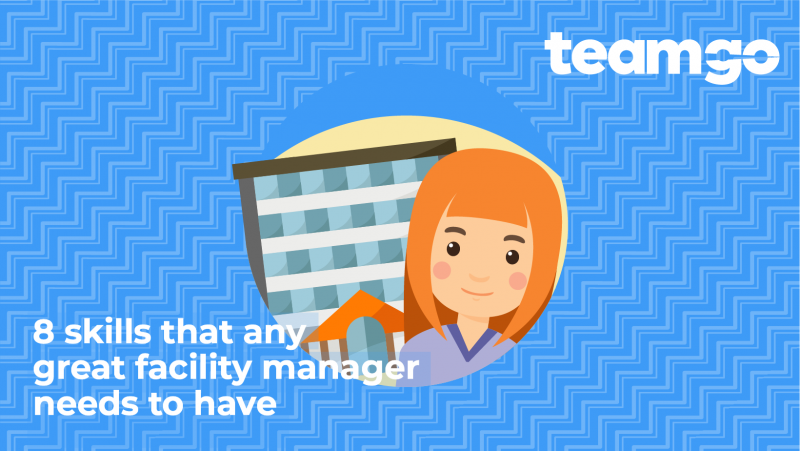Not too long ago the job of a Facilities Manager was far simpler. They were responsible for supervising the physical amenities of the company, its safety, security and compliance. It was fairly straight-forward and functional. However, in recent years their role has evolved.
Today, Facilities Managers must ensure that their buildings deliver an experience to those who use it. Their role has become far more people-centric and service-based. Ultimately, their responsibility is to ensure that a building, its surroundings and its services meet (and hopefully exceed) employees’ and visitors’ expectations.
The modern Facilities Manager must handle a wide variety of duties which might include:
-Managing catering, parking, security, cleaning and maintenance
-Ensuring basic facilities such as water, heating and cooling are maintained
-Managing budget in a cost-effective way
-Managing building spaces such as meeting rooms and lobbies
-Ensuring the facilities comply with government regulations and standards
-Overseeing refurbishments and other building projects
-Drafting reports and making written recommendations
-Overseeing technology implementation and maintenance
-Managing teams
-Liaising with tenants or employees
-Organising building events
This broad scope requires industry professionals to have a range of interdisciplinary skills and a mind for problem-solving. The job demands a lot of those who perform it and Facilities Managers often have to stretch themselves to juggle extremely different tasks.
We’ve shortlisted what we believe to be the 7 most important skills for a Facilities Manager:
1. Openness to technology
The era of technology is here. We are living in it, and so are Facilities Managers. In fact, according to research, technology is considered the most important resource within the industry. Over the last few years we’ve witnessed the rise of tech innovations such as the Internet of Things (Iot), Machine Learning, Big Data and Building Automation in Facilities Management. One example is Teamgo Visitor Management System, which enables Facilities Managers to improve efficiency in their buildings. But it doesn’t stop there. New technology is constantly being developed and commercialised. It has become imperative that Facilities Managers have an eye open for new technologies which can both improve the way they run their buildings and bring provide a better experience to those using it.
2. Communication skills
Facilities Managers are always in contact with other people. They deal with the maintenance teams, such as cleaners and security personnel; they liaise with employees or building tenants; and they deal with outside vendors or major stakeholders. Therefore, effective communication and interpersonal skills are a must. Ensuring that a respectful but meaningful communication is maintained can go a long way and guarantee job success. But it is also important to understand that communication is only valuable when it flows bidirectionally. Don’t talk at people. Talk with them. Make sure you’re understood but understand what others say too. In a job like Facilities Management where there are so many moving parts, communication is the thing holding it all together.
3. Leadership
As previously mentioned, the Facilities Manager will be the one managing maintenance teams, organising events, overseeing building projects and liaising with external suppliers or contractors. They are the ones taking initiatives and conveying the company’s corporate goals through Facilities Management. Therefore, it is imperative that they have excellent leadership and organisation skills. They must motivate and inspire those working under them and make sure all staff understand what the company is about, so their ultimate goals can be achieved. In addition, it is their responsibility to monitor the performance of their staff, evaluate them and make changes as necessary.
4. Analytical mind
Facilities Managers have to deal with an incredible amount of data every day, whether it’s building usage statistics, user satisfaction rates or financial plans and budgets. Therefore, relevant numerical skills and critical thinking are crucial. I’m not saying you need to be a mathematics Nobel prize winner, but being able to make sense out of key numbers is required. All you need to do is track the right facilities management metrics, extract meaningful insights from them and use those insights for problem solving.
Some of these relevant metrics can include:
-Office space utilised (%)
-Meeting rooms utilised (%)
-Technical space utilised (%)
-Total downtime of equipment and software
-Total electricity consumption
5. Adaptability
It goes without saying that things don’t always go as planned. Think of all the things that could go wrong in your daily operations. There might be an emergency situation. The elevator might stop working. Contractors might not show up. Your initial budget might not match the real figures. Dealing with these uncertainties is definitely challenging, but being able to act in spontaneity and scramble up plan B is an incredibly valuable skill. Staying calm under pressure requires a lot of quick thinking and adaptability skills.
6. Empathy
Traditionally, the core duty of a Facilities Manager is servicing the building, but this role is becoming more human-centric everyday. It has become less about the building itself and more about what value it provides to its users. A big part of Facilities Management, for example, is creating a happier and healthier work environment. To do so, Facilities Managers must exercise empathy at all times. They need to put themselves in the user’s shoes to truly understand what their days are like, what their pain-points are and ultimately what they need from the facilities.
7. Sustainability mindset
Sustainability has become a large part of the corporate world. Several companies are including sustainability in its values and culture in order to respond to the society’s growing demand for it. This “green” shift hugely impacts the way Facilities Management is conducted. Green buildings are becoming more common and they are proven to reduce energy consumption, increase productivity and reduce waste. Making sure you’re up to date with sustainability trends and practices is a big plus. At the end of the day, green buildings are a win-win situation for the company and the environment.
8. Legal knowledge
A big part of being a Facilities Manager is ensuring the facilities are compliant with government regulations as well as security, work health and safety and environmental standards. It is critical that Facilities Managers have a complete understanding of what regulations and standards there are, what implications they have for their workplace and how to address them effectively. That doesn’t mean you need to be a law graduate to do the job. Just that you need to understand the implications of relevant regulations to your facilities and industry. This can include law in the federal, state and local spheres and more specifically torts law, especially when it comes to premises liability, personal injury and employment law.
To sum it up
Being a Facilities Manager doesn’t mean the same as meant ten years ago. The role has moved away from being functionality-based to service-based, putting people and their experiences as its main priority. To succeed in the role Facilities Managers must master the following skills:
-Openness to tech: tech is your ally. Use it.
-Communication: talk with people, not at them. Understand other and make sure you’re understood.
-Leadership: initiative, organisation and leadership go hand in hand.
-Analytical mind: think like a problem-solver.
-Adaptability: if things don’t go as planned, wing it.
-Empathy: this role is about people. Put yourself in their shoes.
-Sustainability: keep up with the times. Sustainability and efficiency go together.
-Legal knowledge: understand the regulations you must comply with and what that entails to the business.






